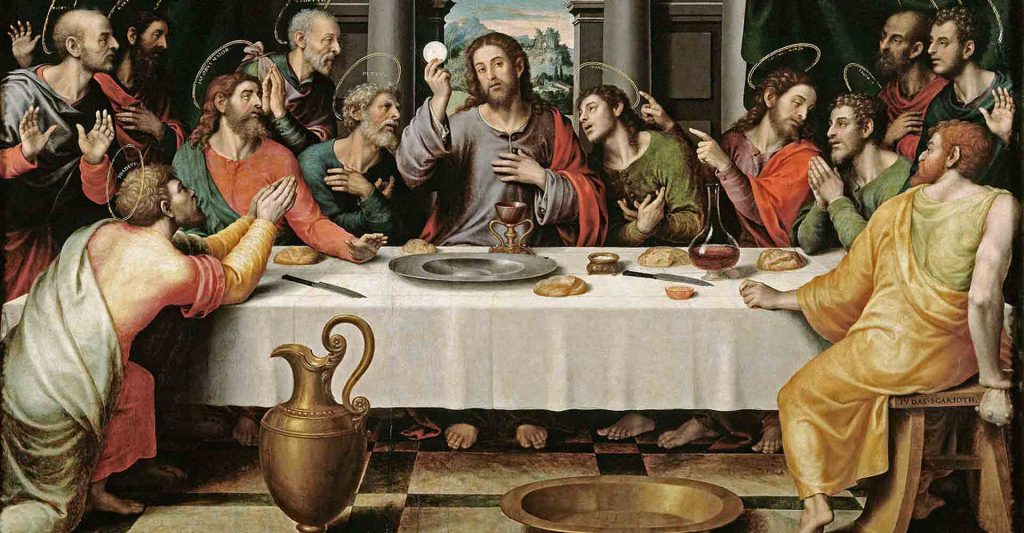
The Eucharist is Christ himself. It’s the lifeblood of the Christian and the heart of the Church. The American novelist Flannery O’Connor once commented about how the Eucharist was the center of her existence. “All the rest of life is expendable,” she said. If we plumb the depths of the Eucharist in faith, we are met with the fact that we cannot live without it.
By Deacon Frederick Bartels
14 June 2020
In our gospel on Corpus Christi (John 6:51-58), we hear the Bread of Life discourse Jesus gave to the Jewish crowds—a few of those present were his own disciples. After Jesus says, “I am the living bread that came down from heaven; whoever eats this bread will live forever; and the bread that I will give is my flesh for the life of the world,” some people were astonished. Shocked. They quarreled amongst themselves, saying, “How can this man give us his flesh to eat?”
Obviously, they thought Jesus was speaking literally. They understood him to be teaching that people need to eat his flesh, like they eat bread, like they eat food. It’s the only explanation for their question, “How can this man give us his flesh to eat?”
Notice how Jesus responds. He doesn’t say anything like, “Wait, you misunderstand! I was simply saying, ‘I’m the Vine and you’re the branches.’ I was speaking symbolically!” No. Jesus doesn’t say anything like that. He makes no attempt to soften his teaching. Instead, he repeats his words in a more direct, emphatic way, saying, “Amen, amen, I say to you, unless you eat the flesh of the Son of Man and drink his blood, you do not have life within you.”
If we continue to read in chapter six of John’s gospel, we find that many of Jesus’ disciples rejected his teaching (John 6:60), “returned to their former way of life and no longer accompanied him” (John 6:66).
Given the fact that salvation is possible only in Christ (John 14:6), it is unthinkable that our Lord Jesus would deliberately allow his hearers to go away misunderstanding his teaching. The point is, his teaching was clear. It was direct. They didn’t misunderstand it. They rejected it.
Jesus’ Teaching is The Church’s Teaching
Catholics know that when Jesus speaks about eating his flesh and drinking is blood he is speaking about the Eucharist. We know this because at the Last Supper our Lord took the bread into his hands and said, “This is my body” (Luke 22:19), and likewise he took the cup of wine and said, “This is my blood of the covenant, which is poured out for many for the forgiveness of sins” (Matt 26:28).
Catholics down through the ages have always believed that the Eucharist is the body, blood, soul, and divinity of Christ. We find this perennial belief from the early Church Fathers to Catholics today. It’s a foundational dogma of the Church. Under the signs of consecrated bread and wine, we sacramentally consume the flesh and blood of Christ, the glorified and risen Lord. We even find this belief coming from the lips of St. Paul, who said in 1 Corinthians:
Whoever, therefore, eats the bread or drinks the cup of the Lord in an unworthy manner will be answerable for the body and blood of the Lord. Examine yourselves, and only then eat of the bread and drink of the cup. For all who eat and drink without discerning the body, eat and drink judgment against themselves. (1 Cor 11:27-29)
Since the Eucharist is Christ, it’s a saving reality. That is, provided we receive it worthily and with a proper disposition. If not, it becomes our judgment.
A Crisis of Faith and Belief
What do you believe about the Eucharist? Do you believe what Jesus, Tradition, scripture, and the Church teach about it? On the other hand, do you know what this teaching is?
Apparently, there are a lot of Catholics who don’t.
The Pew Forum released a disturbing study in August of 2019 indicating only about 1/3rd of people who identify as Catholics in the U.S. believe the Eucharist is the body and blood of Christ. The other 2/3rds think it’s merely symbolic.
It’s not surprising that only about 1/3 of US Catholics have an orthodox belief that the Eucharist is truly Christ himself. Why do I say that? Because less than about 30% of U.S. Catholics attend Mass at all, other than perhaps on Christmas and Easter. So, the Pew survey has to be interpreted in that light. That is, some of the findings of the survey are based on the views of people who are Catholic in name only; they’re nominal Catholics who are not in full communion with the Church.
Here’s the really disturbing part of the survey: about 1/3 of Catholics who do attend Mass each Sunday, don’t believe that the bread and wine are converted into the body and blood of Christ. They believe that the consecrated bread and wine merely symbolically represent Jesus, which is technically a heretical position.
These findings represent what we already know: we’re in the midst of a terrible crisis of faith. There are lots of reasons for it: lack of reverence for the Eucharist during the holy sacrifice of the Mass; extraordinary ministers who wear jeans, t-shirts, and sandals; a failure in catechesis; indifference toward learning the faith; freethinking disregard for the belief of the Church; religious indifferentism, the loss of truth that continues to spread through the world due to that tragic moment in the 16th century when Protestant revolutionaries rejected union with the Church. Relativism. Modernism. Sin.
Orthodoxy of Faith
Given the situation, what does Christ and his Church teach about the Eucharist?
In the Eucharistic Liturgy, during the words of consecration pronounced by the priest, the bread and wine are converted by the power of the Holy Spirit into Christ himself. They are transformed into the body, blood, soul and divinity of the Risen Lord Jesus. We use the word “transubstantiation” to describe this miraculous change that occurs. The substance of the bread and wine is transformed, converted into the glorified body of Jesus Christ—the glorified body of Jesus is truly, substantially, wholly present in the Eucharist in its entirety. Thus we say that the Eucharist is the Real Presence of Christ. Of course, we can’t see his bodily presence. Jesus is sacramentally present in the Eucharist, meaning he is invisibly present there, under the signs of bread and wine. Note that the bread and wine are signs, not symbols.
All of this means that the Eucharist is Christ himself. It’s not a symbol of Christ. It’s not a representation of Christ. It’s not that Christ is present alongside the bread and wine, as if they somehow co-exist (a heretical belief coined by Martin Luther called “consubstantiation”). It’s not Christ with bread and wine. The bread and wine no longer exist in substance. The Eucharist is Christ himself.
We see and taste bread and wine because the appearances of bread and wine remain, which are called “accidents” according to the technical term. However, the reality of what is truly present is the body, blood, soul, and divinity of the Risen Christ.
We Believe the Eucharist Is Christ Because That’s What The Son of God Says It Is
Why do we believe this teaching as Christians? Because it is the teaching of God himself. At the Last Supper, when Jesus took the bread into his hands, he did not say, “This symbolizes my body” or “contains my body.” Jesus Christ, who is truly God and man, said, “This is my body.” As Catholics, we take Jesus at his word. We believe in faith what he says. Additionally, we take Jesus at his word in John’s gospel, where he says:
Those who eat my flesh and drink my blood have eternal life, and I will raise them up on the last day; for my flesh is true food and my blood is true drink. Those who eat my flesh and drink my blood abide in me, and I in them. (John 6:54-56)
If a person believes the Eucharist is only a symbol after hearing Christ’s teaching, he denies the divinity of Christ, for as God he promised that the consecrated bread is his body, it is his glorified flesh and blood.
I’m reminded of a story about the American novelist Flannery O’Connor, whose writing often reflected her Catholic beliefs. Ms. O’Connor was having dinner with a former Catholic, Mary McCarthy, and her husband, Mr. Broadwater. Mrs. Broadwater had left the Church at age 15 and become a “Big Intellectual,” as Flannery described it. Consequently, Flannery had nothing to say to her, since they had nothing of importance in common. At some point during the dinner, the subject of the Eucharist came up. Flannery O’Connor writes:
Well, toward morning the conversation turned on the Eucharist, which I, being the Catholic, was obviously supposed to defend. Mrs. Broadwater said when she was a child and received the Host, she thought of it as the Holy Ghost, He being the ‘most portable’ person of the Trinity; now she thought of it as a symbol and implied that it was a pretty good one. I then said, in a very shaky voice, ‘Well, if it’s a symbol, to hell with it.’ That was all the defense I was capable of but I realize now that this is all I will ever be able to say about it, outside of a story, except that it is the center of existence for me; all the rest of life is expendable.”
So true. In comparison to belief in and reception of the Eucharist, all the rest of life is expendable. I don’t know whether Mrs. O’Connor thought about this or not, but Christ said as much: “Amen, amen, I say to you, unless you eat the flesh of the Son of Man and drink his blood, you do not have life within you.”
Read: The Eucharist is more than just a meal.

Deacon Frederick Bartels is a member of the Catholic clergy who serves the Church in the diocese of Pueblo. He holds an MA in Theology and Educational Ministry and is a Catholic educator, public speaker, and evangelist who strives to infuse culture with the saving principles of the gospel. For more, visit YouTube, iTunes and Twitter.

Leave a Reply